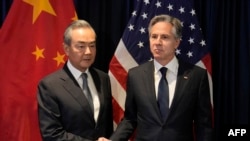U.S. Secretary of State Antony Blinken said Friday that he would meet with Chinese Foreign Minister Wang Yi next week in Laos, as that country hosts senior officials of the Association of Southeast Asian Nations, or ASEAN.
Blinken said he speaks with Wang “on a fairly regular basis,” which is important for clarifying each country’s intentions and avoiding unintended conflicts.
“We're able to communicate very clearly on areas where we disagree. So at least China knows where we're coming from, just as we know where they're coming from,” on such topics as the South China Sea and Taiwan, Blinken told an audience Friday at the Aspen Security Forum, a prominent national security and foreign policy conference in the United States.
Although the U.S. and China are not members of the Southeast Asian bloc, senior diplomats from both countries are typically invited to attend related regional meetings and often hold face-to-face discussions on the sidelines.
On Friday, the U.S. government advised American citizens in Taiwan to plan accordingly for an upcoming annual air defense exercise in Taiwan called Wan An Number 47, scheduled for Monday through Thursday. During the 30-minute exercise for civilians, the emergency notification system will be tested, signaling the start and end of the event.
Next week, Taiwan’s military will also hold its annual Han Kuang defense drills, which usually include large-scale live-fire exercises.
The air defense drills occur as Chinese military aircraft and vessels continue to operate around Taiwan. In recent months, Taiwan has reported that Chinese military aircraft frequently cross the median line and enter Taiwan's air defense identification zone.
“If there were to be a crisis over Taiwan, it would be a crisis that affects quite literally everyone in the world, not just the immediate neighbors. Fifty percent of commercial cargo traffic goes through the [Taiwan] Strait every day; 70% of the semiconductors that the world relies on are manufactured in Taiwan,” Blinken said Friday.
Blinken’s talks with Wang next week in Vientiane, the capital of Laos, will follow a four-day major policy meeting held by China’s ruling Communist Party (CCP) in Beijing.
Known as China’s Third Plenum, the meetings endorsed policies aimed at advancing the country’s technological power and fortifying its national security.
The personnel changes made at the plenum attracted a lot of attention as the CCP officially approved the removal of its former foreign minister, Qin Gang, from its Central Committee.
Additionally, the plenum confirmed the expulsion of former Defense Minister Li Shangfu. Li Yuchao and Sun Jinming of the People's Liberation Army's Rocket Force were also removed from the Central Committee.
ASEAN has announced its intention to expedite negotiations with China on a code of conduct to reduce the risk of conflicts in the hotly contested South China Sea. The Southeast Asian bloc hopes to conclude talks by 2026.
“We're tracking all the time, not just the Taiwan Strait, [but also the] South China Sea," Blinken said at the Aspen forum. He noted escalating tensions between China and the Philippines because of recent collisions near the waters around Second Thomas Shoal, known as Rén'ài Jiao in China.
According to an international tribunal's legally binding decision issued in July 2016, Second Thomas Shoal is within the exclusive economic zone of the Philippines, and China has no lawful maritime claims to the waters around the low-tide feature.
Beijing has rejected the ruling, claiming "indisputable sovereignty" over most of the South China Sea.
